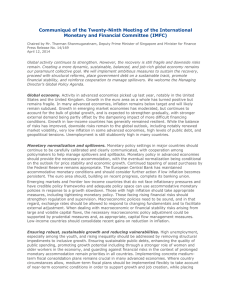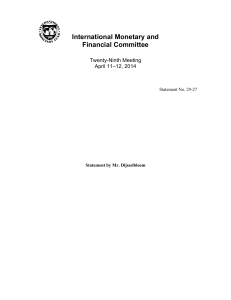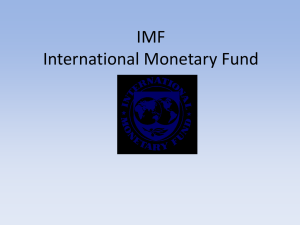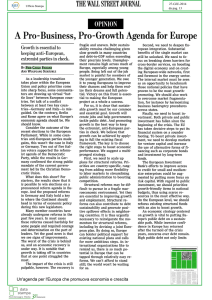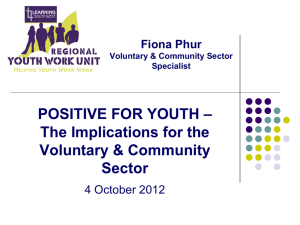International Monetary and Financial Committee
advertisement
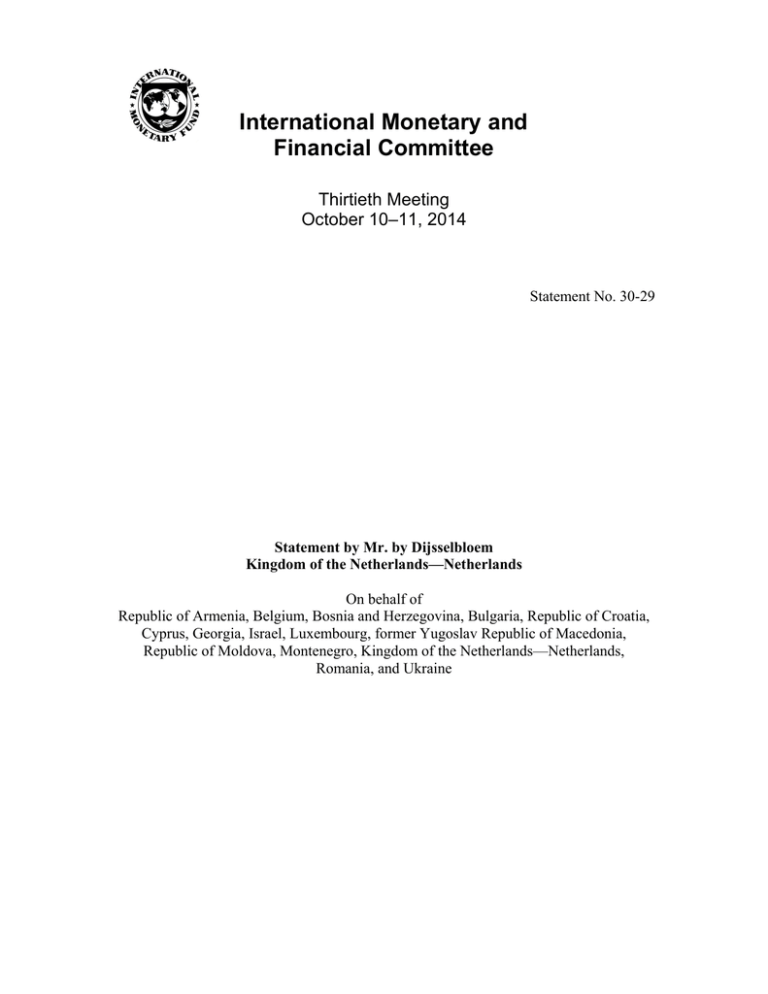
International Monetary and Financial Committee Thirtieth Meeting October 10–11, 2014 Statement No. 30-29 Statement by Mr. by Dijsselbloem Kingdom of the Netherlands—Netherlands On behalf of Republic of Armenia, Belgium, Bosnia and Herzegovina, Bulgaria, Republic of Croatia, Cyprus, Georgia, Israel, Luxembourg, former Yugoslav Republic of Macedonia, Republic of Moldova, Montenegro, Kingdom of the Netherlands—Netherlands, Romania, and Ukraine Statement by Mr. Jeroen Dijsselbloem Minister of Finance, The Netherlands on behalf of Armenia, Belgium, Bosnia and Herzegovina, Bulgaria, Croatia, Cyprus, Georgia, Israel, Luxembourg, Former Yugoslav Republic of Macedonia, Moldova, Montenegro, The Netherlands, Romania and Ukraine At the 30th International Monetary and Financial Committee Washington DC, October 10-11, 2014 International financial and economic situation and policy priorities Global economy We start these Annual Meetings on a less positive note than the Spring Meetings six months ago. Although the global economy is still recovering, the IMF's latest outlook sketches this recovery as vulnerable and uneven. Growth in a large part of the world falls short of expectations. Geopolitical tensions, if prolonged, will negatively affect the global economic outlook and risks for financial stability remain. Nevertheless, there is still cause for optimism. In the euro area, unprecedented measures have been taken to strengthen its foundations. In the US and UK, the recovery is accelerating. Emerging market economies continue to support global growth, albeit at a slower pace, and the outlook for low income countries is remarkably robust. The Fund rightfully points to structural reforms as the key challenge to stimulate demand and address lower potential growth in advanced economies and supply-side-bottlenecks in emerging market economies. Ambitious reforms are needed to strengthen our optimism and bring the global economic recovery back on track. Advanced economies The euro area is emerging slowly but gradually from a long recession. While the growth uptick is somewhat less than we thought six month ago, we remain optimistic. Over the past years, significant measures have been taken to strengthen the core euro area governance framework and robustness. Also the ECB has taken unprecedented measures. But it is clear that one further crucial step is needed to fully lift the recovery: a substantial stepping up of structural reforms. In some euro area countries this approach already reaps benefits. The impressive performance of program countries provides testimony to the importance of structural reforms in achieving higher growth and restoring confidence. Structural reforms raise potential output in the medium–to-long run and some structural reforms can have a beneficial effect in the short run. For example, reducing labor costs 2 through tax reforms does not only boost cost-competitiveness but can also stimulate demand through increased purchasing power and consumption. Improvements in human capital will provide workers with the skills they need to find jobs that are rewarding and productive. This will contribute to lowering unemployment and reducing inequality. Reforms geared towards facilitating access to finance, especially for SME’s, reduced administrative burden and productivity promoting research and innovation will enhance both the capacity of as well as the incentives for additional private investment. The more firms trust that these reforms will be implemented vigorously, the more they will be inclined to actually invest. Turning to the availability of finance, the comprehensive assessment is key as it will force banks to repair their balance sheets where needed. It will contribute to re-building a sound banking sector capable of financing profitable investments and further underpin renewed market confidence. It should eventually lead to increased real economic growth. Alternative financing sources should complement bank financing. The internal market already offers major opportunities. Further integration of European capital and credit markets, including a deeper securitization market, will further facilitate the financing of productive investments. At the same time, sound fiscal policies remain another necessary key element. Public debt is still high in many euro area countries. The recent crisis has shown the vulnerabilities that arise when markets lose confidence in public debt sustainability. While spreads have decreased substantially over the last two years, this confidence can again evaporate quickly. The euro area has to operate within the rules of the Stability and Growth Pact, which serves as anchor of confidence and would be self-defeating to break. However, existing flexibility within those rules could be used to better address the weak recovery and to make room for the cost of needed structural reforms. Furthermore there is still plenty of leeway to achieve a more growth-friendly composition of fiscal policies. Expansionary monetary and fiscal policies have limited effect without structural reforms. In Japan, highly accommodating monetary policy and a boost to public spending have generated a temporary economic upswing, but forceful structural reforms focused on the provision of risk capital, services deregulation and labor supply are necessary. In the US, the relatively strong recovery is projected to be sustained over the next few years. Nonetheless, to improve the medium-term outlook, trends of decreasing labor participation and low total factor productivity growth must be reversed. Progress on the supply-side, by strengthening active labor market policies, improving education and stimulating infrastructure investment, has so far been limited. At the same time, monetary accommodation has resulted in the underpricing of risk in certain segments of the US and 3 global financial markets and the shift in financial intermediation from the banking sector to the non-bank financial system. More in general, very loose monetary conditions warrant vigilance. New financial bubbles can quickly develop. Signs of excessive financial risk taking are already emerging across many advanced and emerging economies, although less so within the Euro area. Financial market optimism indicates that the uncertainties regarding the macro-outlook and the pace of withdrawal of monetary stimulus might be underpriced. Capital has been moving into the non-bank financial system, creating a new source of financing for the real economy, but also suggesting the emergence of new, potential risks. Macroprudential tools could contribute to preventing the building-up of excessive risks, but they are not a panacea for financial stability and still at an early stage of implementation. Monetary policy makers therefore should remain vigilant for financial stability risks. Emerging market economies Emerging market economies so far continue to support global growth and have, in the process, contributed to some necessary reduction of global imbalances. Better macropolicies, increased buffers and flexible exchange rates have enabled many emerging market economies to cope well with recent bouts of volatility in financial markets. However, at the same time, growth projections for EME’s have repeatedly been revised downwards. The larger than expected slowdown in investment may indicate a weak investment climate and adjustment to lower long-term growth potential. Continued structural reforms should thus address these problems. In addition, a faster than expected tightening of monetary policy in the US remains a possibility. Rebuilding of buffers, strengthening fundamentals and increased monitoring of financial sector exposures and risks remain necessary, albeit in different degrees for different countries. Low-income countries Improvements in business and investment regimes and better macro-economic policies make for a remarkably robust outlook for low income countries. Some important challenges nevertheless remain. Managing potential shortfalls in commodity revenues requires conservative budget policies, with special focus on limiting growth of current expenditures. Furthermore, low-income countries that recently gained access to international financial markets cannot take this for granted, as investors increasingly tend to hoard and look less at country-specific circumstances when market volatility returns. Domestic revenue mobilization should be explored to increase resilience against potential external shocks. Finally, the Ebola virus has, beyond the humanitarian consequences, hit some economies 4 very hard. The international community should continue to stand ready to step in and help to dampen the negative impact of this shock. IMF Policy Issues Governance reform Swift implementation of the 2010 General Review of Quotas and Governance Reforms remains our highest priority in order to ensure that the IMF maintains the legitimacy and resources to fulfill its global mandate. In our constituency, all countries have completed their national procedures to allow the amendment and the quota adjustment to become effective. We urge the US to do the same. With the creation of the new constituency in October 2012, the Netherlands and Belgium have reduced the Board representation of advanced European countries’ members by one seat. We have thus fulfilled half of the commitment of advanced European members to reduce the number of their Executive Directors by two. We remain committed to constructive and inclusive discussions on the 15th General Review of Quotas (GRQ) within the Executive Board and the IMFC. We reiterate that any decision on the 15th GRQ and the Quota Formula Review will have to be taken as an integrated package. The main variables of the quota formula should remain both GDP and openness which best capture the role and mandate of the IMF. As openness reflects the Fund’s mandate and in particular its increased focus on spillovers and economic and financial interconnectedness, it is an indispensable part of the formula and its weight should at least be maintained. The methodology of openness should be maintained. Surveillance The 2014 Triennial Surveillance Review (TSR) has provided valuable insights on how to further improve Fund surveillance, building on experience with the Integrated Surveillance Decision (ISD). We welcome the priorities set out in the TSR, in particular the increased attention to financial sector surveillance, macroprudential policy measures, macro-critical structural policies including labor market reforms and coherence of Fund surveillance with monitoring by other international institutions. The Fund should continue to strengthen its analysis of spillovers and should further streamline its surveillance products. Further integration of multilateral analysis in bilateral surveillance products, and vice versa, will enhance the clarity and consistency of messages and improve their traction. We support moving the TSR to a five year cycle and look forward to the interim review that should focus on implementation of key recommendations. We believe that the Fund should deliver on its recommendations within a flat real budget by suitably prioritizing and sequencing its implementation activities, in line with the priorities noted above. 5 We welcome the focus of the FSAP on systemic risks. The FSAP is an integral component of IMF surveillance and must identify at an early stage risks from financial sector imbalances and inadequacies in regulatory frameworks. We support the enhanced assessment of macroprudential policies and find it important that the IMF develops a consistent framework to help and assess national authorities design and implement macroprudential policies. This could be realized in cooperation with the FSB. As regards the EU and euro area and more particularly the creation of the Banking Union, we are confident that the Fund will adapt its operational modalities appropriately. In particular, national FSAPs for euro area members should also include the regional perspective in the future. Risks of shadow banking, as illustrated in the GFSR, show the importance of macro-financial surveillance by the Fund. Addressing these risks requires active monitoring and vigilant prudential authorities, but also reforms aimed at improving the long-term resilience of the financial system. While policies and oversight aimed at addressing shadow banking risks are far from finished, we are moving forward. On a global scale, reforms for a resilient financial sector are in different stages of implementation, while an active monitoring framework is emerging. In this regard, the work of the IMF and the FSB on shadow banking is very welcome. IMF Lending The IMF continues to play an important role in providing financial support to a broad range of countries experiencing adverse shocks. The expansion of the lending toolkit has ensured that the Fund is better equipped to deal with the increased integration of member countries in the global financial system. The Fund’s precautionary lending instruments complement the regular lending instruments. They have become an important part of the global financial safety net. Precautionary lending helps prevent and mitigate the setbacks for countries experiencing difficult external environments in the aftermath of the crisis. It anchors countries’ efforts to further strengthen the resilience of their economies. The ongoing discussion on the reform of the Debt Limits Policy for LICs should result in sufficient flexibility for such countries with a Fund supported program to better cover their financing needs with a broader set of funding sources, while preserving debt sustainability. We welcome the IMF’s work on the Lending Framework and Sovereign Debt and the recently proposed reforms in the contractual framework. We look forward to further proposals for a comprehensive approach on sovereign debt restructuring. While a number of open questions remain, we broadly support reform of the exceptional access framework, to allow for debt reprofiling operations in the event that i) a member has lost market access and ii) there is uncertainty whether debt is sustainable with high probability. The proposal of the Fund will preserve public debt sustainability for the benefit of debtor countries and 6 their creditors and will ensure that Fund lending catalyzes renewed access to financial markets. The proposed reforms to address collective action problems will ensure that future debt restructurings will be conducted in a more orderly manner. We support the IMF’s role in promoting contract reform and note that the approach in the euro area is considered as appropriate. In our constituency, Armenia, Bosnia and Herzegovina, Cyprus, Georgia, Romania and Ukraine currently benefit from Fund financial support. Macedonia and Moldova take part in Post-Program monitoring. We welcome the Fund’s continuing support to these countries. We support the Fund’s ongoing engagement in Ukraine. The Stand By Arrangement, for which the first review has been successfully completed, is making an important contribution to the stabilization of the economy. The government of Ukraine has shown commitment to implement structural reforms, despite significant economic and political challenges. Going forward, the authorities deserve continuous strong support, from the Fund as well as the international community. IMF resources and precautionary balances It is of great importance that the IMF remains adequately resourced in order to fulfill its mandate. The IMF should remain a quota-based institution. The NAB and bilateral loans provide much needed, albeit temporary, resources for the Fund’s lending capacity. These second and third lines of defense are needed as long as the agreed doubling of quotas has not become effective and global economic risks remain tilted to the downside. Our Constituency has provided support to the recent extension of the bilateral loans to the Fund and the extension of the activation period of the NAB.
